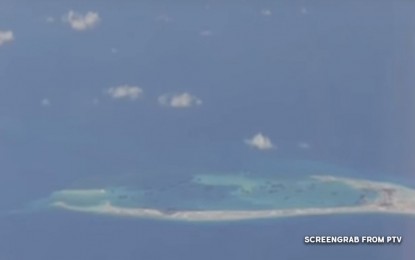
MANILA – President Rodrigo Duterte’s position in the West Philippine Sea (WPS) will not waver even if he regards China as a close friend, Malacañang said on Tuesday.
Presidential Spokesperson Harry Roque made this remark after Duterte, in a recent public address, said he would ignore those who criticized his “careful” foreign policy on the Philippines’ sea dispute with China.
“Our principal position and stand on the West Philippine Sea remains. I have said it before and I will say it again. Our agencies have been directed to do what they must and should to protect and defend our nation’s interests,” Roque said in a Palace press briefing.
Roque said Duterte has directed Philippine vessels to continue to patrol relevant areas and firmly assert the country’s territorial claims.
“The Philippine Navy, the Philippine Coast Guard, and the Bureau of Fisheries and Aquatic Resources will be where they need to be,” Roque said.
He said the Department of Foreign Affairs, as lead agency, will be at the forefront in advancing the country’s interests while harnessing time-honored principles of international law.
Roque also noted that Duterte’s position that no country can ignore the Philippines’ 2016 arbitral victory against China still stands.
“We will not waver in our position. Ang Pilipino ay may prinsipyo at mayroong paninindigan, lalo na para sa Inang Bayan (Filipinos are principled and determined, especially for the Motherland),” he said.
Roque defended Duterte’s decision to resolve the maritime row through “peaceful” means as a responsible member of the international community.
“Diplomacy, therefore, will play an ever-important part,” he added.
Bilateral talks
Roque also emphasized their preference for the Philippines to hold bilateral talks with China to end the maritime conflict.
“Let us fully utilize the bilateral consultation mechanisms or BCM and other diplomatic venues to engage China,” he said.
He said all stakeholders have expressed support for Duterte’s stance on issues concerning the WPS.
“All stakeholders have professed fealty to these fundamental principles. It’s time for all of us to walk our talk,” he said.
Critics to blame
Although he acknowledged the ongoing sea dispute has yet to be resolved, Roque denied that China is making further advancements in the Philippines’ territorial waters.
“Wala po akong nakikitang tensyon sa West Philippine Sea. Ang tensyon ho ay binubuo ng mga kritiko dito lang sa Pilipinas po. Pero sa labas naman po ng Pilipinas, e alam naman po natin na may problema pero wala naman pong tensyon. Hindi po gaya nung nangyari diyan sa Scarborough Shoal. So ang ingay po ay naririto sa Pilipinas lamang (I don’t see any tension in the West Philippine Sea. The tension is being created by critics here in the Philippines. But outside the Philippines, we know that there’s a problem but there’s no tension. Unlike what happened there in the Scarborough Shoal),” he added.
Duterte as well as Roque and Locsin have repeatedly blamed the past administration for pulling out Philippine vessels from Scarborough Shoal to ease the standoff upon alleged advice of the US. Manila pulled out its ships but China stayed and eventually took possession of the territory.
Roque earlier said the 2012 standoff between the Philippine and Chinese maritime forces in Scarborough Shoal was responsible for escalating the tension among claimant countries in the WPS.
2 spokespersons
In his Talk to the People aired Monday night, Duterte ordered only Roque to speak on issues concerning the WPS.
Roque clarified that Department of Foreign Affairs (DFA) Secretary Teodoro Locsin Jr. will also be allowed to speak on the matter.
Asked if the National Task Force on the West Philippine Sea (NTF-WPS) will still be permitted to release statements on the issue, Roque said the task force’s inputs will now be covered by “executive privilege.”
“Reports of the NTF-WPS are forwarded to the DFA and they will determine if they will file diplomatic protests. So these are matters, facts, which are relevant to diplomatic communications covered by executive privilege. So although there is transparency, an exception to transparency are diplomatic communications and that includes also inputs which form the basis of diplomatic communication,” he said.
He, however, denied that the NTF-WPS’s statements were ever considered “harmful”.
“I never said they’re harmful. I just said it’s covered by executive privilege because we need to allow the executive branch to make the correct decision no matter what,” he added. (PNA)
